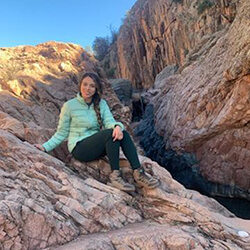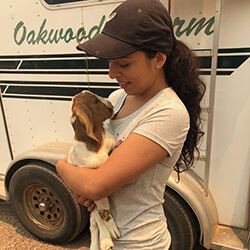Eliminating Barriers to Health Care a Motivating Factor for Third-Year Medical Student to Pursue Rural Medicine
COVID-19 forced everyone to pivot last year, including three third-year medical students who were members of the inaugural Longitudinal Integrated Clerkship (LIC) cohort in Payson, Arizona. The clerkship was created through a collaborative partnership between the Rural Health Professions Program at the University of Arizona College of Medicine – Phoenix and the MHA Foundation to address the critical physician shortage in rural communities in Arizona, such as Payson. The clerkship is designed to embed medical students in the community for eight months as they learn about rural health and develop their skills.
What led you to participate in the Longitudinal Integrated Clerkship (LIC)?

Did you learn anything surprising about rural health — such as the differences in demographics?
Payson is a very beautiful place to be and not only a great opportunity for students to learn, but also to explore. Something that I did learn there is that even though it’s a rural community, we share a lot of the same medical problems that we do in the big city. You really had to think, "What if a patient couldn't receive their medical treatment? What can we do instead?" It gave me the opportunity to really think critically.
For example, in Phoenix we are working in hospitals where we have different specialists available to us. In Payson, we had a patient with cardiac problems, and we didn't have access to consult with a cardiothoracic surgeon or a cardiologist that was a specialist in what was going on with her. And that was challenging, so we ended up having to actually utilize telemedicine and consult with other physicians.
What was also very surprising to me was actually the relationship that the physicians had with their patients. It felt like they really knew each other, and they really had this bond and trust. It was very, very magical to see.
Do you have anyone in your family who lived in a rural environment?
When I was in middle school, right before starting high school, I moved to Mexico, and we lived in a very small town. There weren’t any medical providers available. There was no clinic or hospital there in the town. If you needed to get treatment, you had to drive to the nearest city. My sister got stung by a scorpion, and she had a very bad reaction to it. We didn’t have a vehicle to take her to the nearest city, so we had to find someone to drive us to the city. There were a lot of barriers in place, which made it difficult. Thankfully, she ended up being okay.
What was a new experience you gained from participating in the Payson LIC?
One of the things that I was very surprised about was there were plenty of opportunities to form relationships with your patients.
It's more of a tight-knit community where everyone knows each other. They (physicians) know everyone's kids, even if they are not necessarily their patients. There’s just a different sense that you get. I feel like a lot of that also forms trust, helping build even stronger relationships. I definitely saw that the patients were very comfortable, very open to speak about their medical problems and felt comfortable that they were going to be taken care of. That is really good.
What were some of the more interesting experiences you had in Payson?

Also, there were wildfires near Payson, so close you could smell the smoke and definitely see it. It was affecting the surrounding communities. So, for a week or so, I stopped providing patient care, and I ended up going with Dr. Hunt’s daughter to rescue and bring animals back from these communities.
Did you learn anything about yourself and how you will practice medicine as a result of participating in the Payson LIC?
I always had this interest in rural health. I find it interesting. And even though I didn't really have experience as a medical student in it, I felt like after I did the LIC, I would repeat it. I would do it again, just because the experience I received as hands-on in the education and training was a lot more than I ever expected. I definitely could see myself working in some capacity in rural areas. I learned a lot.
I feel that it's very unfair that some people can't receive medical treatment because of distance and where they live. There are so many barriers to access health care, and it just feels unfair. So, if I can be someone that can help close some of this gap, I'd be able to help out in that area. I feel like the LIC made a big impact in my medical education and training.
About the College
Founded in 2007, the University of Arizona College of Medicine – Phoenix inspires and trains exemplary physicians, scientists and leaders to advance its core missions in education, research, clinical care and service to communities across Arizona. The college’s strength lies in our collaborations and partnerships with clinical affiliates, community organizations and industry sponsors. With our primary affiliate, Banner Health, we are recognized as the premier academic medical center in Phoenix. As an anchor institution of the Phoenix Bioscience Core, the college is home to signature research programs in neurosciences, cardiopulmonary diseases, immunology, informatics and metabolism. These focus areas uniquely position us to drive biomedical research and bolster economic development in the region.
As an urban institution with strong roots in rural and tribal health, the college has graduated more than 1,000 physicians and matriculates 130 students each year. Greater than 60% of matriculating students are from Arizona and many continue training at our GME sponsored residency programs, ultimately pursuing local academic and community-based opportunities. While our traditional four-year program continues to thrive, we will launch our recently approved accelerated three-year medical student curriculum with exclusive focus on primary care. This program is designed to further enhance workforce retention needs across Arizona.
The college has embarked on our strategic plan for 2025 to 2030. Learn more.